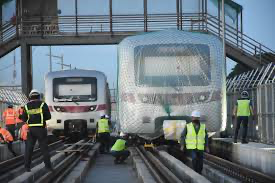San Miguel Corporation’s infrastructure arm has signed a pivotal operations and maintenance (O&M) services agreement with Korea Railroad Corporation (KORAIL) for the MRT-7 project, reinforcing the transition from construction to full operations and signaling a step forward in Philippine mass transport development.
SMC MRT-7 Corp., a wholly owned subsidiary of San Miguel Corporation (SMC), formalized the partnership ahead of the railway’s expected full launch in 2026. Under the deal, KORAIL will provide long-term technical expertise, guiding the development of operational systems, safety frameworks, and maintenance strategies for the 22-kilometer elevated railway linking North Avenue in Quezon City to San Jose del Monte, Bulacan.
“This is a critical step as we move closer to delivering MRT-7 to the public,” said Ramon S. Ang, SMC chairman and CEO. “This partnership with KORAIL brings us closer to our goal.”
With its vast experience operating South Korea’s rail systems, including the high-speed KTX, KORAIL is expected to ensure a seamless transition to operational readiness. The engagement begins in July 2025, with an initial 6-12 month period focused on system stabilization and pre-operational testing.
Ang emphasized the project’s commercial and national significance, highlighting that SMC’s investments aim to not only alleviate urban congestion but also contribute to sustainable economic growth. He also acknowledged the Department of Transportation’s role in overcoming delays and aligning stakeholder efforts, crediting secretary Vince Dizon’s leadership.
For the government, the partnership aligns with President Marcos’ directive to modernize public transport. “We prioritize passengers,” Dizon said, through remarks delivered by undersecretary Timothy John R. Batan. “We are ensuring that projects like MRT-7 provide comfort, safety, and efficiency.”
KORAIL president and CEO Han Moon Hee called the partnership a “landmark of cooperation and mutual prosperity,” adding that MRT-7 could set a new standard for railway projects in the country.
Once operational, MRT-7 is expected to significantly reduce travel time between Quezon City and Bulacan, decongest road traffic, and improve regional mobility—delivering strong commercial and social dividends for the Philippines.







